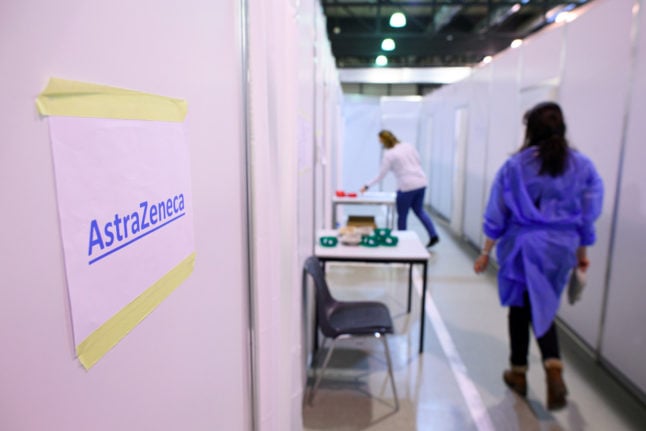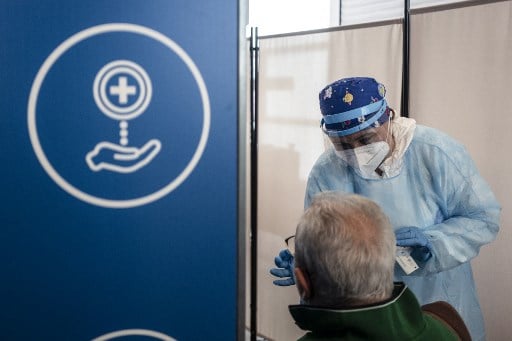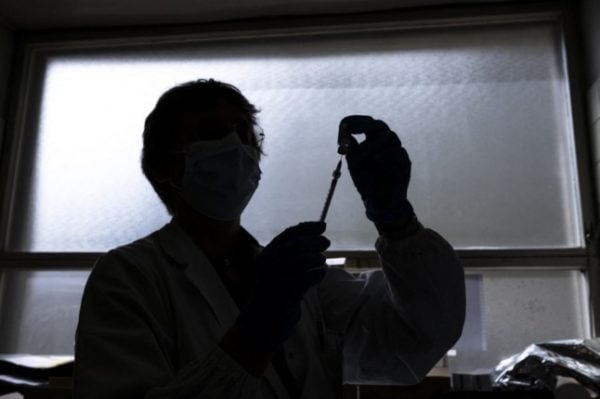UPDATE: All German states are now offering this vaccine to all adults.
What’s happening?
Germany follows a strict priority list on who is allowed to book an appointment for a vaccine first. It’s based on recommendations by the STIKO vaccination committee and focuses mainly on age, health conditions and jobs.
But this week the German states of Bavaria, Berlin, Mecklenburg-Western Pomerania and Saxony announced they would open up appointments for AstraZeneca – or Vaxzevria as it was recently renamed – to all adults, even those not on the priority list.
READ ALSO: Four German states offer AstraZeneca to all adults
Isn’t AstraZeneca for over 60s?
Since March 31st, Germany has recommended that only the over 60s get the AstraZeneca injection due to links with very rare blood clot conditions.
However, if an adult patient under 60 wants the vaccine, has a consultation and individual risk analysis with the doctor giving the vaccination and is made fully aware of all risks, it is possible to get this jab.
So why are these four states widening out the access?
The goal is to avoid wasting doses. Throughout the vaccination campaign in Germany, reports have emerged of AstraZeneca doses being left unused.
The state of Saxony said many people who are eligible for a vaccine are waiting for BioNTech/Pfizer even though they could have AstraZeneca now.
In Bavaria the health ministry said lifting the priority list for AstraZeneca is to ensure “that medical practices can immediately and flexibly inoculate with the vaccine”.
Bavaria’s health minister Klaus Holetschek said: “Every dose of vaccine must be administered as quickly as possible.” Nothing should be left lying around, he added.
Okay, so if I want this vaccine, what should I know?
One of the most important things to be aware of is that a consultation is mandatory before you get the AstraZeneca vaccine.
In each case, getting the jab is on the condition that patients receive detailed advice from a doctor on the possible side effects of the jab before vaccination.
“The release (of AstraZeneca to all adults) is an offer that those who have no or few reservations about the vaccine can take advantage of so they also have the opportunity to also be vaccinated against coronavirus,” said Mecklenburg-Western Pomerania’s health minister Harry Glawe (CDU).
According to the Bavarian health ministry, the use of AstraZeneca in people under 60 “is possible after medical advice and with individual risk acceptance by the patient”.
What are the risks?
There have been reports of a very rare blood clotting condition after getting a shot with the Astrazeneca vaccine. This prompted Germany to review the use of the Oxford-Swedish vaccine and restrict its use in the under 60s.
The Bavarian broadcaster BR24 reports that up until April 15th, 59 cases of cerebral sinus venous thrombosis, or CSVT, after vaccination with AstraZeneca had been reported to Germany’s Paul Ehrlich Institute (PEI), including 45 women and 14 men.
According to the Robert Koch Institute (RKI), more than 4.2 million first doses and over 4,100 second doses of the AstraZeneca vaccine had been administered by mid-April which shows that the risks are extremely low.
Of the 45 women affected between the ages of 20 and 72, five were older than 60 and six have died. Of the 14 men affected, two were between 60 and 70-years-old, all the others were also younger than 60. Six of the men affected also died.
READ MORE: Why has Germany restricted the use of AstraZeneca in under 60s?
How can I register for a vaccination now?
If you are under the age of 60 and not in any of the priority groups but would like to get the AstraZeneca vaccine you can apply to do so in these four states.
The first thing you should do is look at the information on your local government’s website. In most places, doctors are giving out the AstraZeneca jab so you should check if your GP is taking part.
According to the Bavarian health ministry, GPs will inform their patients about vaccine offers. The availability of doses, however, depends on how many are delivered to the doctor by the government.
Bavarian broadcaster BR24 also says that to get the jab in Bavaria you do not have to live in the state.
All people over the age of 18 who have health insurance in Germany or who have their place of residence or habitual residence in Germany are entitled to be vaccinated with the AstraZeneca vaccine Vaxzevria in a Bavarian doctor’s practice, said BR24.
In Berlin we’ve heard anecdotally that people who want the vaccine are calling up their GP and joining waiting lists.
In Saxony AstraZeneca is being given out in doctors’ surgeries. “In concrete terms, this means that people under 60 years of age can also decide to receive this vaccine after being informed by their doctor – even if they do not belong to a prioritisation group,” said the social affairs ministry.
In Mecklenburg-Western Pomerania, the AstraZeneca vaccine is to be given out not only via GPs, but also via vaccination centres and mobile vaccination teams. However, according to a spokesperson for the health ministry, the principle of residence applies: “Citizens with registered residence in Mecklenburg-Western Pomerania can be vaccinated.”
Keep in mind that there still is likely to be long waits for the vaccine unless the practice has leftover doses.
Will other states follow?
They may decide to change course but at the moment it’s only in these four states. Some states against the move have said there is still not enough supplies to open the offer out to other adults.
But things do seem to be moving along. German Health Minister Jens Spahn said this week that the priority list will be lifted in June so that the offer of vaccines can be opened up to all adults – although it doesn’t mean everyone will get a jab in June.
READ ALSO: ‘We won’t be able to offer everyone a vaccine in June’, warns Health Minister
Who is liable if something goes wrong?
In Germany, the federal state is generally liable in the event of serious damage after a recommended vaccination, reported BR24.
Doctors or healthcare professionals can of course be liable if a mistake is made with the vaccination, according to the Munich medical lawyer Alexander Ehlers.
When giving the AstraZeneca vaccine to someone under 60, a doctor could possibly be held liable if he or she did not provide enough information. However, once the doctor has provided the information, the patient probably has to bear the risk themselves, according to Ehlers.
READ ALSO: How do I prove I belong to one of Germany’s priority groups?




 Please whitelist us to continue reading.
Please whitelist us to continue reading.
Wh on earth soes one want Astra instead of BioNTec?
Personally I have not much faith in the Astra vaccine.
Please have a look at
https://www.telegraph.co.uk/global-health/science-and-disease/covid-vaccines-moderna-vs-astrazeneca-pfizer-difference-uk-blood-clots/
Why not, there is an entire country called UK that took Astra and they are better off than Germany. Even though India is in bad shape now there are more than 40 million people who took Astra and helping the country. If you don’t want to take Astra please do not take it but don’t create unnecessary fear in others- The system is clear that all risks should be explained properly before a person is given Astra and Benefits outway Risk and more people are dying of COVID than Vaccines.
There is nothing wrong with the AstraZeneca vaccine. I had my first shot about a month ago and will be fully vaccinated by June.
The AZ vaccine is safe, its not safe. GPs can vaccinate from April, but only 26 vials per week, company doctors are encouraged to vaccinate employees, no they’re not. Every adult can have their vaccine by June. But probably not.
COME ON!! This country’s handling of the vaccine programme is a joke. Serbia, Chile, Hungary, Israel and dozens of other developed nations have run rings around this German third world shambles.